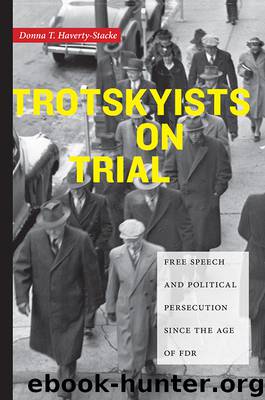Trotskyists on Trial by Donna T. Haverty-Stacke

Author:Donna T. Haverty-Stacke
Language: eng
Format: epub
Tags: HIS036060 History / United States / 20th Century
Publisher: NYU Press
“Unnecessary Victimizations”: Trotskyists under Fire from “Tobin’s Men” and the FBI
Although the Trotskyists found supporters among unionized workers around the country, they remained estranged from many of their brothers in Minneapolis. Drivers there remained divided; most joined the ranks of 544-AFL, but some stayed loyal to the Dunnes and 544-CIO. The Smith Act convictions made this acrimonious situation worse by embittering the 544-CIO supporters, who believed Tobin was behind the prosecution. Those in 544-AFL, especially a core group from the Committee of 99, wanted to break their rival union and drive its Trotskyist leaders out of the labor movement. Working with IBT leaders and employers, they fought against 544-CIO’s appeal of labor conciliator Alfred Blair’s decision and blacklisted the Trotskyists. Very much aware of the opposition they continued to face from 544-AFL and the IBT, Dunne, Dobbs, and the others kept up the fight in Minneapolis for as long as they could, altering their trade union strategy only when it became clear that 544-CIO could no longer survive.
The ultimate defeat of 544-CIO was not inevitable, not even after its Trotskyist leaders were convicted of conspiring to advocate the violent overthrow of the government. There was still the possibility that those leaders could be vindicated on appeal. And there was also the trouble brewing within 544-AFL that threatened to undermine its campaign against the Trotskyists. In the center of the controversy were James Bartlett and a group of his supporters who, discontented with the IBT’s trusteeship over 544-AFL, violently challenged it.
Concerns about Bartlett and his clique emerged even before the Smith Act trial came to a close. In November 1941, I. E. Goldberg wrote to Joseph Padway about the situation. Goldberg was a lawyer retained by the IBT to oversee its business in Minneapolis, and Padway was his legal partner and also one of the AFL’s chief lawyers then stationed in Washington. According to Goldberg, Bartlett “seemingly is behaving,” but a group of men with whom he had been meeting on a regular basis were seen congregating outside the union headquarters in parked cars where they talked about terminating the trusteeship. Although “there have been no open rump meetings,” there was a rumor that Bartlett’s clique was planning “a concerted movement at the general meeting of December 9 to demand the right to hold an election.” In addition to these rumors, Goldberg reported, was the assault on Stephen Nehotte, 544-AFL’s recording secretary and one of its organizers. Nehotte had been approached by some of Bartlett’s followers to join their push for new elections; shortly after turning them down, “while riding home in his automobile [he] was cut off by another automobile and two shots were fired over his car.” Worried about these disruptions, Goldberg suggested that the union gently push Bartlett and his clique out of their positions as organizers by holding “a little banquet” for them “with a few speeches and flowery remarks” praising their work. In this way, they could be “weeded out and no bad taste is left, nor antagonisms created” that might drive them to the CIO.
Download
This site does not store any files on its server. We only index and link to content provided by other sites. Please contact the content providers to delete copyright contents if any and email us, we'll remove relevant links or contents immediately.
The Secret History by Donna Tartt(16611)
The Social Justice Warrior Handbook by Lisa De Pasquale(11486)
Thirteen Reasons Why by Jay Asher(7783)
This Is How You Lose Her by Junot Diaz(5755)
Weapons of Math Destruction by Cathy O'Neil(5032)
Zero to One by Peter Thiel(4818)
The Myth of the Strong Leader by Archie Brown(4787)
Promise Me, Dad by Joe Biden(4441)
Stone's Rules by Roger Stone(4413)
Beartown by Fredrik Backman(4406)
How Democracies Die by Steven Levitsky & Daniel Ziblatt(4393)
The Fire Next Time by James Baldwin(4338)
100 Deadly Skills by Clint Emerson(4072)
A Higher Loyalty: Truth, Lies, and Leadership by James Comey(4028)
Rise and Kill First by Ronen Bergman(4009)
The David Icke Guide to the Global Conspiracy (and how to end it) by David Icke(3876)
The Farm by Tom Rob Smith(3870)
Secrecy World by Jake Bernstein(3774)
The Doomsday Machine by Daniel Ellsberg(3726)
